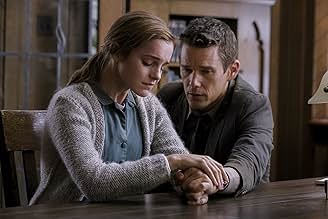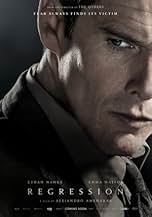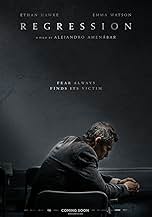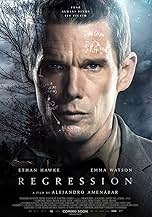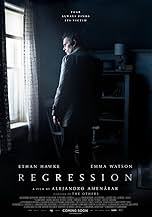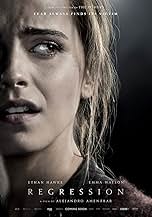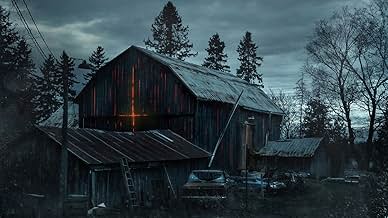PUNTUACIÓN EN IMDb
5,6/10
44 mil
TU PUNTUACIÓN
Un investigador y un psicoanalista descubren pruebas de un culto satánico mientras investigan la violación de una joven.Un investigador y un psicoanalista descubren pruebas de un culto satánico mientras investigan la violación de una joven.Un investigador y un psicoanalista descubren pruebas de un culto satánico mientras investigan la violación de una joven.
- Dirección
- Guión
- Reparto principal
- Premios
- 1 premio y 2 nominaciones en total
Reseñas destacadas
And it's also a mystery how we watch movies or what we expect of them. You may watch something and think it's the best thing ever, just to find out you're more or less alone with that sentiment. But that's why arguing or even discussing movies can be so much fun and is intriguing to say the least.
Take this movie, which is not the best thriller ever made, but is more than rock solid. I really liked it and it has to do with the acting, the mood it builds up, the tension throughout and how it makes sense altogether. That doesn't mean that everyone enjoys it or will enjoy watching it. Especially if you can't wrap your head around what is happening - or how it is happening. Some won't like how it turns out (no pun intended), but it was fitting in my book. It's something more for the mind rather than something that just relies on shock values (though it has more than its fair amount of that too)
Take this movie, which is not the best thriller ever made, but is more than rock solid. I really liked it and it has to do with the acting, the mood it builds up, the tension throughout and how it makes sense altogether. That doesn't mean that everyone enjoys it or will enjoy watching it. Especially if you can't wrap your head around what is happening - or how it is happening. Some won't like how it turns out (no pun intended), but it was fitting in my book. It's something more for the mind rather than something that just relies on shock values (though it has more than its fair amount of that too)
If you can trust an actor to make a good horror, lately that one is Ethan Hawke. From Sinister, to The Purge, or Daybreakers, he knows how to pick them and make the most of them.
A lot more psychological than the rest, Regression has a beautiful story, with a great dark atmosphere, suspense, scares, all the ingredients to a good little horror. I was intrigued from start to end, waiting to see more, trying to wrap my brain around it, and expecting a finish that would make the most sense.
And boy I got it all! It really is a great production, an example of what a horror should look like, goes hand in hand with Deliver Us From Evil, both movies are smart and filled with tension.
Cheers!
A lot more psychological than the rest, Regression has a beautiful story, with a great dark atmosphere, suspense, scares, all the ingredients to a good little horror. I was intrigued from start to end, waiting to see more, trying to wrap my brain around it, and expecting a finish that would make the most sense.
And boy I got it all! It really is a great production, an example of what a horror should look like, goes hand in hand with Deliver Us From Evil, both movies are smart and filled with tension.
Cheers!
I knew nothing about the film before I watched it, nor about the events on which it is based. Perhaps because of this I became very confused about the film's point of view.
At base, this film asks the viewer to try to distinguish reality from fantasy during a police inquiry into accusations of satanic abuse. The problem with the fim-maker's style, for me, was that all the resources of cinema were used to illustrate not only the satanic abuse reported by witnesses but also other scenarios that had not been reported, so we saw constant scenes of abusers with spookily made-up faces and monks' cowls, and various horrific depictions of satanic abuse. Because cinema is a naturalistic medium, it was difficult to know what was fantasy and what was reality.
The film in some ways had a classic detective-story structure, with Ethan Hawke as the determined investigator. But it became clear that he was an unreliable first-person character after he began behaving irrationally, and that left me, as a viewer, with nothing to cling to as a source of viewpoint in the film. When it came to scenes in which the detective was absent, it was even more difficult to distinguish what the film-maker was depicting as real and what as fantasy. For example, when the victim's grandmother went out to her shed, she saw a normal cat, which turned into a devil cat. This had nothing to do with the investigation, yet its satanic imagery was of the same type as that provoked by the regression-therapy sessions. Perhaps some point was being made about the phenomenon of group hallucination or delusion, but the film repeatedly neglected its responsibility to give us a touchstone by which we could judge the accuracy of what we were seeing.
I think the film could have addressed the topic better with the excellent actors at its disposal by NOT depicting any of the satanic events. It would have been all the more chilling for that, adding to the tension of the inquiry. The most famous dramatisation of this sort of subject matter was Arthur Miller's "The Crucible". Miller creates nightmarish scenes of communal paranoia but without illustrating any of the events described by the witnesses. And this does not hinder the story's potency. (What could be more horrific than to see Miller's village girls in full accusatory mode, triggering the arrest of various pillars of the community on charges of devil worship?) "Regression", however, lacks the necessary moral distance from the events it depicts. Only in the last minute or two is sanity restored. I left the cinema feeling as if I had been cruelly led about by the nose to no satisfactory purpose.
At base, this film asks the viewer to try to distinguish reality from fantasy during a police inquiry into accusations of satanic abuse. The problem with the fim-maker's style, for me, was that all the resources of cinema were used to illustrate not only the satanic abuse reported by witnesses but also other scenarios that had not been reported, so we saw constant scenes of abusers with spookily made-up faces and monks' cowls, and various horrific depictions of satanic abuse. Because cinema is a naturalistic medium, it was difficult to know what was fantasy and what was reality.
The film in some ways had a classic detective-story structure, with Ethan Hawke as the determined investigator. But it became clear that he was an unreliable first-person character after he began behaving irrationally, and that left me, as a viewer, with nothing to cling to as a source of viewpoint in the film. When it came to scenes in which the detective was absent, it was even more difficult to distinguish what the film-maker was depicting as real and what as fantasy. For example, when the victim's grandmother went out to her shed, she saw a normal cat, which turned into a devil cat. This had nothing to do with the investigation, yet its satanic imagery was of the same type as that provoked by the regression-therapy sessions. Perhaps some point was being made about the phenomenon of group hallucination or delusion, but the film repeatedly neglected its responsibility to give us a touchstone by which we could judge the accuracy of what we were seeing.
I think the film could have addressed the topic better with the excellent actors at its disposal by NOT depicting any of the satanic events. It would have been all the more chilling for that, adding to the tension of the inquiry. The most famous dramatisation of this sort of subject matter was Arthur Miller's "The Crucible". Miller creates nightmarish scenes of communal paranoia but without illustrating any of the events described by the witnesses. And this does not hinder the story's potency. (What could be more horrific than to see Miller's village girls in full accusatory mode, triggering the arrest of various pillars of the community on charges of devil worship?) "Regression", however, lacks the necessary moral distance from the events it depicts. Only in the last minute or two is sanity restored. I left the cinema feeling as if I had been cruelly led about by the nose to no satisfactory purpose.
This film is not a conventional 7 - a score I would tend to give to a decent but not outstanding film. Regression was in some ways an 8, or dare I say it 9, but some of its flaws are just too bad g to ignore.
I will start by talking about its strong points. The story line and script were engaging, unpredictable and fresh. There were enough twists and turns to keep the viewer guessing, and without too much in fact happening, the film is disturbing and uncomfortable to watch. The twists as the film goes on are not outlandish - a careful viewer will be able to pick up on a number of subtle clues. The acting is good and the characters succeed of convincing us of their roles - mostly.
What then is wrong? First and foremost - whilst the female lead is a good actress, her American accent just isn't convincing enough for us to forget about Hermione. Secondly, whilst I am no expert of the American justice system, some of the practises and actions taken by the police seem questionable and unrealistic. The psychologist is cliché and annoying - going round insulting strangers for having religious beliefs. The ending is an anti climax once the big revelation has occurred, and it seems like the writers tried to re kindle the atmosphere, which doesn't happen. The ending is also a bit hard to square in your mind logically.
Therefore, whilst this film is a very enjoyable watch, its flaws deprive it of the 8+ score in my eyes.
I will start by talking about its strong points. The story line and script were engaging, unpredictable and fresh. There were enough twists and turns to keep the viewer guessing, and without too much in fact happening, the film is disturbing and uncomfortable to watch. The twists as the film goes on are not outlandish - a careful viewer will be able to pick up on a number of subtle clues. The acting is good and the characters succeed of convincing us of their roles - mostly.
What then is wrong? First and foremost - whilst the female lead is a good actress, her American accent just isn't convincing enough for us to forget about Hermione. Secondly, whilst I am no expert of the American justice system, some of the practises and actions taken by the police seem questionable and unrealistic. The psychologist is cliché and annoying - going round insulting strangers for having religious beliefs. The ending is an anti climax once the big revelation has occurred, and it seems like the writers tried to re kindle the atmosphere, which doesn't happen. The ending is also a bit hard to square in your mind logically.
Therefore, whilst this film is a very enjoyable watch, its flaws deprive it of the 8+ score in my eyes.
This film tells the story of a policeman who investigates a woman's claim that she is the victim of abuse from a Satanic cult, which includes her father and a fellow policeman colleague.
"Regression" has a very intriguing plot! I have to say that I did not see the twists coming, even though I had several possibilities in mind. Ethan Hawke is convincing as a dedicated policeman who wants to get to the bottom of the abuse, in order to help the poor woman who naturally evokes much sympathy from viewers. The story is intense because the mystery is well built, and the suspense is well kept. I enjoyed watching "Regression" a lot.
"Regression" has a very intriguing plot! I have to say that I did not see the twists coming, even though I had several possibilities in mind. Ethan Hawke is convincing as a dedicated policeman who wants to get to the bottom of the abuse, in order to help the poor woman who naturally evokes much sympathy from viewers. The story is intense because the mystery is well built, and the suspense is well kept. I enjoyed watching "Regression" a lot.
¿Sabías que...?
- Curiosidades"Satanic Panic" is the name of the cultural obsession with "Satanic Ritual Abuse" which originated in the United States in the 1980s with the now-discredited memoir-style book "Michelle Remembers," written by Canadians Michelle Smith and her husband, psychiatrist Lawrence Pazder. The authors made waves during the 80's by traveling the talk-show circuit and testifying as expert witnesses in criminal trials alleging Satanic abuse. The book and Smith are represented in the film as "In Satan's Name" by S. Cooper, who is shown as a TV interview subject whose face is obscured in shadow to hide her identity.
- PifiasThe poster of Polish Death/Black Metal Band Behemoth is from 2014 whereas the film is set in 1990.
- Citas
Bruce Kenner: I am starting to use my head again.
- ConexionesFeatured in Projector: Macbeth/Regression (2015)
- Banda sonoraThat's Where the Blues Begin
Written by Thomm Jutz and Peter Cronin
Music Library & SFX SL / Audio Network Ltd
Selecciones populares
Inicia sesión para calificar y añadir a tu lista para recibir recomendaciones personalizadas
- How long is Regression?Con tecnología de Alexa
Detalles
- Fecha de lanzamiento
- Países de origen
- Sitio oficial
- Idioma
- Títulos en diferentes países
- Regression
- Localizaciones del rodaje
- RC Harris Water Treatment Plant, Toronto, Ontario, Canadá(prison exteriors)
- Empresas productoras
- Ver más compañías en los créditos en IMDbPro
Taquilla
- Presupuesto
- 20.000.000 US$ (estimación)
- Recaudación en Estados Unidos y Canadá
- 55.039 US$
- Fin de semana de estreno en EE. UU. y Canadá
- 33.915 US$
- 7 feb 2016
- Recaudación en todo el mundo
- 17.671.101 US$
- Duración1 hora 46 minutos
- Color
- Mezcla de sonido
- Relación de aspecto
- 2.35 : 1
Contribuir a esta página
Sugerir un cambio o añadir el contenido que falta




